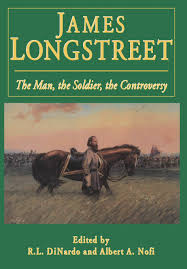Longstreet, Leadership, and the Judgment of History
The United States Civil War was, by far, the nation’s bloodiest and greatest challenge. Any serious engagement with the history of the war underscores how horrific – and important – it was to our nation’s history. Reading about the war and its history, which has long been disputed and argued, reminds me that the Civil War’s outcome was not foreordained. It was the consequence of choice, leadership, determination and contingencies.
Reading James Longstreet: The Man, the soldier, the Controversy underscores those observations. A solid volume of essays edited by R. L. DiNardo and Albert A. Nofi, the book is more than twenty years old and retains its relevance. Leadership, on and off the battlefield, is a vital topic of interest and concern today. So, too, are the ways that scholarship, advocacy and politics can shape history and our collective understanding.

Longstreet was one of the Confederate Army’s most prominent generals. Born in South Carolina and raised in Georgia, he attended West Point and had a successful military career in the US Army until the start of the Civil War. He resigned his commission and became a key figure in the south’s military effort. Longstreet was known for his defensive tactics. He fought in multiple key battles, gaining greater responsibilities and eventually working directly under Robert E. Lee, who headed the Confederate military effort. Lee called Longstreet his “old war horse” and consistently supported him. Longstreet was responsible for a key attack at Gettysburg that failed, leading many in the South to blame Longstreet for the loss and, eventually, much more. Lee was a consistent supporter of Longstreet, even after the battle of Gettysburg. Through the course of the war, Longstreet’s reputation and overall effectiveness were widely affirmed.
After the Civil War, Longstreet preached cooperation with the north and the Union. Like many who held leadership roles in the Confederate military, he sought leadership as a civilian. Unlike almost all other southern military leaders, Longstreet joined the Republican party. It was this, and his subsequent commitment to working with the union and with blacks, that made him a target in the south, in the public eye, and in historical analysis.
A group of former Confederate military commanders, all associates to Lee, targeted Longstreet after Lee’s death. Longstreet became a scapegoat for the loss of the confederacy. They labelled him incompetent during the war and worse, a villain who contributed to the loss of southern dignity during Reconstruction. Truth was ignored and history was “rewritten” to serve political ends. Longstreet’s poor judgment in how he defended his military record compounded the situation. In the century plus that followed the conclusion of the Civil War, Longstreet was the only Confederate general to have no statue or memorial tribute in the South. It is telling evidence of how post-war interpretation shaped collective understanding.
DiNardo and Nofi’s volume emerged from a conference on Longstreet, supported by the New York Military Affairs Symposium. The scholars who attended focused on Longstreet’s career and his legacy. Essays in the volume examine Longstreet’s pre-Civil War career, his leadership style, which was more “modern” than most of his contemporaries, battlefield tactics, and broader historical questions of interpretation. It is accessible, even for someone who is not deeply attuned to the history of the Civil War. Taking the heroism and horrors of the war as a given, the essays collectively provide a good understanding of a professional soldier’s career before, during and after the Civil War. One cannot read about what Longstreet and his contemporaries wrestled with, though, and not be affected by the violence and loss. Further, the essays reinforce what we already know about popular historical understanding: it is contested, politicized, and always suspect to manipulation. Truth and truths may not emerge immediately, but with careful consideration and scholarship, we may get there eventually.
David Potash